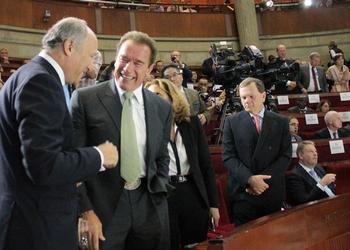
PARIS, France, October 13, 2014 (ENS) – This past weekend Région Ile-de-France hosted the first World Summit of Regions for Climate on October 10 and 11 in Paris at the Palais d’Iena.
The Summit was organized in partnership with R20 Regions of Climate Action. Attendees included regional leaders, government officials, heads of large corporations, investors, associations, and the media.
Chaired by Arnold Schwarzenegger, former Governor of California and Founding Chair of R20 Regions of Climate Action, this summit gathered some 500 regional and local governments from five continents to contribute to a new legally-binding international agreement to limit climate change.

In collaboration with World Climate Ltd., the event mobilized regions, cities, businesses, investors and universities around a joint declaration calling for commitment to a series of concrete actions toward sustainability, including sustainable mobility, within the framework of the Road to Paris 2015.
The event pushed forward the “positive agenda” of the 21st session of the Conference of the Parties to the UN Framework Convention on Climate Change (COP21) in December 2015, in Paris.
COP21 will focus on the adoption of a legally-binding agreement, subsequent pledges by all countries, the Green Climate Fund and carbon pricing.
R20 Regions of Climate Action is working to generate a multi-stakeholder “bottom-up” movement of support for the global climate agreement through the mobilization of regional and local actors.
Both public innovative financial instruments (Pre-Investment Fund) and private ones (investment fund platforms) will be available for large-scale initiatives.
The objective of the Summit was to bring together and engage a broad community of actors in this “bottom-up” approach: regions, cities, businesses, and financial institutions in different areas of the green economy, as well as civil society.
The event provided an opportunity to announce the creation and funding of innovative projects enabling the sustainable reduction of greenhouse gas emissions at the global level.
Examples include an LED lighting project in Brazil for 1.5 million LED street lights, and one gigawatt of renewable energy in Sub-Saharan Africa.
Through concrete commitments from at least 28 states, the United States will reduce its CO2 emissions by 17 percent by the year 2020.
French President François Hollande has indicated that France will participate in the Green Climate Fund before the end of 2014.
Supporting the World Bank’s initiative on carbon pricing, Hollande emphasized that “pollution must have a cost if we want to point investments towards clean and efficient energy.”

The Paris Declaration is a cross-sector initiative founded by R20 and World Climate Ltd. This declaration from subnational governments, business and finance supports an international climate deal during the UN COP21 in 2015.
The World Summit of Regions for Climate closed with the signing of the Paris Declaration, presented on October 11 to Laurent Fabius, French Minister of Foreign Affairs and International Development, and organizer of COP 21.
The Paris Declaration defines, for the first time, commitments expressed jointly by sub-national governments and the private sector, that focus entirely on concrete actions to tackle climate change. The Paris Declaration calls upon the COP 21 Parties to reach an ambitious international agreement to limit global warming.
The Declaration will travel around the world to events such as the UN climate negotiations in Lima, Peru in December 2014, the World Green Economy Summit 2015 in Dubai, COP21 in Paris 2015 and other events, to collect signatures from leaders.
It will be presented at COP21 in Paris as the strongest international Public Private Partnership platform for climate solutions. It is part of the Positive Agenda, as requested by the French Government, who will be hosting the UNFCCC COP 21.
The latest report from the Intergovernmental Panel on Climate Change has once again alerted the international community to the acceleration of change.
Despite strong involvement of the European Union and France in post-Kyoto negotiations, as well as agreed-upon concrete commitments, it is evident that government efforts alone are not sufficient to prevent and fight against climate change.
It is now widely recognized that the fight against climate change must involve all sectors: national governments, local elected officials, businesses, financial institutions, scientists, civil society and private citizens.
Copyright Environment News Service (ENS) 2014. All rights reserved.
© 2014, Environment News Service. All rights reserved. Content may be quoted only with proper attribution and a direct link to the original article. Full reproduction is prohibited.
